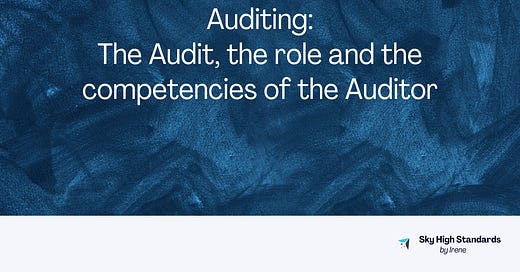Auditing: The Audit, the role and the competencies of the Auditor
How audits vary, emphasising organisational culture, auditor competencies, and key soft skills essential for effective and meaningful audits.
After 20 years of auditing people from different aerospace maintenance organisations, against civil and/or defense standards, ISO 9001, AS9110, etc. I always come back to the same conclusion: audits are never the same.
No matter how well you prepare for an audit, my personal experience tells me that its outcome largely depends on the organisation's culture and its understanding of the audit process and the auditor's role.
Moreover, auditors must possess a broad set of competencies to adapt to each unique scenario and organisational context.
This is why, in the first part of this six-part mini-series, I want to share my perspective on the importance of understanding:
What an audit and an auditor truly are—and what they are not.
The range of soft skills required for auditors to be successful.
This is part of the fortnightly six-part mini-series, where I cover:
Part 1: The Audit – The Role and Competencies of an Auditor
Part 2: The Key Stages of the Audit Process and Typical Audit Activities
Part 3: The Key Aspects before starting an Auditing
Part 4: My Fundamentals of Audit Work Documents and Reporting
Part 5: Communication and Auditing – The Biggest Challenge
Part 6: My Key Takeaways
Let’s dive in! 🤿
What is an Audit and and Auditor - and what they are not
Let’s start with the audit definition. In my own words…
An audit is an independent, systematic, and documented activity designed to determine the extent to which certain requirements are met, with the ultimate aim of improving compliance with the spirit of continuous improvement. This is achieved by obtaining samples of objective and factual evidence gathered at a specific point in time.
Key aspects of an audit include:
It follows a structured methodology
It's evidence-based
It aims to verify compliance and identify opportunities for improvement
It provides assurance to stakeholders
It's conducted by qualified professionals
It results in documented findings and recommendations
There are 3 different types of audits:
First party - Internal
Second party - Customer on supplier
Third party - Certification or independent
This activity must be carried out by competent auditors who possess the necessary knowledge, skills, and experience to assess compliance effectively.
Auditors should be impartial, objective and knowledgeable in relevant standards, regulations and industry best practices.
Their ability to evaluate evidence critically, communicate findings clearly, and provide constructive recommendations is essential in ensuring the audit process contributes meaningfully to organisational improvement.
Hence, an audit and the auditor are not about:
policing
a platform for blaming or embarrasing people
a fault-finding mission
a ticking exercise
a one-time event without follow up
a substitute for management oversight
a guarantee against all risks or failures
The Auditor skills: my top 5
To successfully achieve the aim of an audit, an auditor requires a combination of technical knowledge and a broad spectrum of soft skills.
In essence, auditors act as interviewers, gathering evidence through engagement with people.
However, there are certain skills that I consider essential.
I could list many, but I’d like to highlight my top five:
1. Technical Knowledge and Experience in the Field.
A solid foundation in the relevant industry, regulations, and standards is crucial for conducting effective audits. Understanding the technical aspects allows auditors to assess compliance accurately and provide valuable insights.
2. Diplomacy
Becoming a diplomatic auditor is about more than technical proficiency; it's about creating an environment where trust, understanding, and collaboration are continuously present.
Key diplomatic skills include:
Active Listening: More than just hearing, it involves paying close attention to what is said, reading between the lines, and fostering a constructive atmosphere.
Empathy: The ability to understand the challenges, cultural differences, and concerns of those being audited, promoting mutual respect and cooperation.
Handling Conflict: When disagreements arise, a diplomatic auditor seeks common ground, using tact and negotiation techniques to de-escalate tensions and maintain professionalism.
3. Assertiveness
Being assertive means expressing thoughts, needs, and expectations clearly while respecting the opinions of others.
This includes:
Clear Communication: Convey expectations, observations, and findings concisely and confidently, avoiding ambiguity.
Confidence: Establish credibility by demonstrating expertise, which helps build trust with auditees.
Setting Boundaries: Define the scope and objectives of the audit clearly, keeping discussions focused on relevant areas.
Providing Constructive Feedback: Deliver findings honestly yet tactfully, offering actionable solutions for improvement.
4. Adaptability and Problem-Solving
Every audit presents unique challenges. A skilled auditor must quickly adapt to different environments, personalities, and organizational cultures while thinking critically to resolve unexpected issues.
Flexibility in approach ensures effective audits in diverse contexts.
5. Coaching and Advising
While audits are about assessing compliance, great auditors also help organisations improve.
Providing guidance, sharing best practices, and mentoring auditees foster a culture of continuous improvement, making the audit process more valuable.
That’s all for today.
In two weeks I will focus on the Key Stages of the Audit Process and Typical Audit Activities.
Stay tuned! 🚀 See you next week. 👋
Disclaimer: The information provided in this newsletter and related resources is intended for informational and educational purposes only. It reflects both researched facts and my personal views. It does not constitute professional advice. Any actions taken based on the content of this newsletter are at the reader's discretion.



